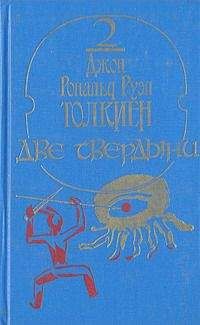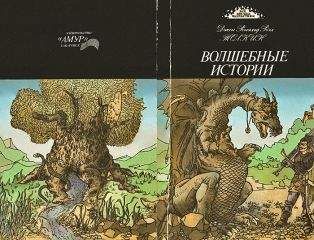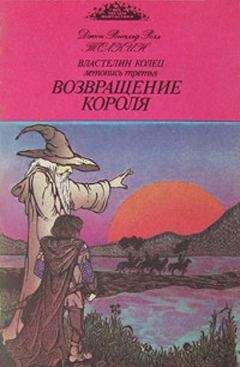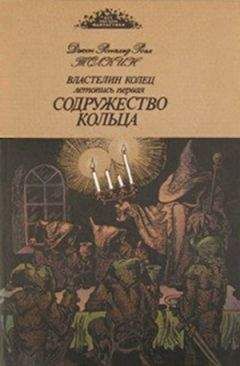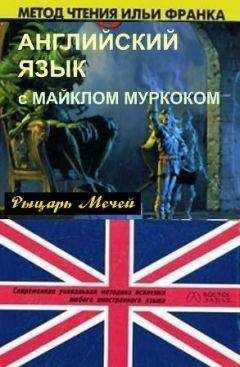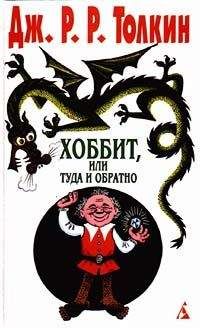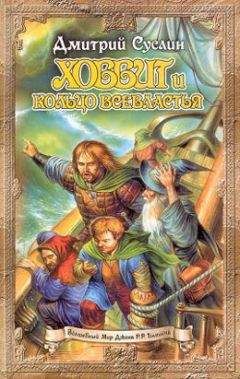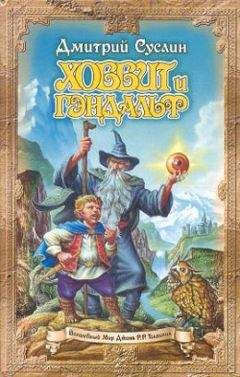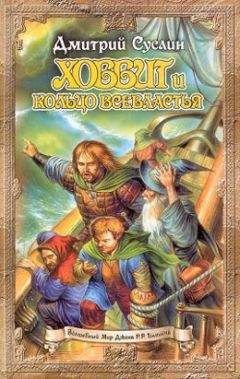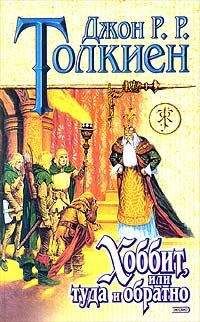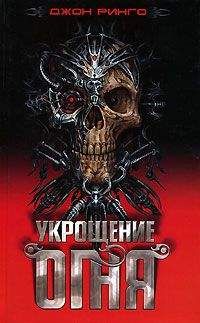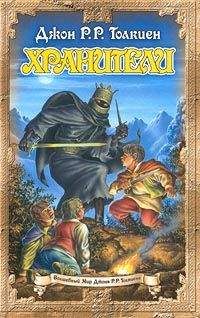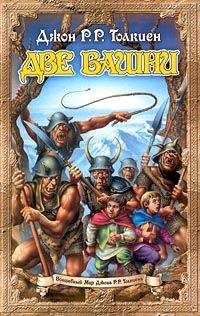Джон Толкиен - Английский язык с Дж. Р. Р. Толкиеном. Хоббит
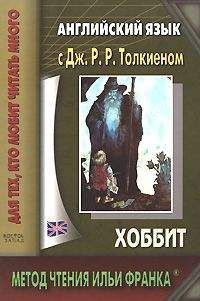
Все авторские права соблюдены. Напишите нам, если Вы не согласны.
Описание книги "Английский язык с Дж. Р. Р. Толкиеном. Хоббит"
Описание и краткое содержание "Английский язык с Дж. Р. Р. Толкиеном. Хоббит" читать бесплатно онлайн.
В книге предлагается произведение на английском языке Джона Р. Р. Толкиена «Хоббит», адаптированное (без упрощения текста оригинала) по методу Ильи Франка. Уникальность метода заключается в том, что запоминание слов и выражений происходит за счет их повторяемости, без заучивания и необходимости использовать словарь.
Пособие способствует эффективному освоению языка, может служить дополнением к учебной программе.
Предназначено для студентов, для изучающих английский язык самостоятельно, а также для всех интересующихся английской культурой.
Пособие подготовила Ольга Ламонова.
excellent [ˈeks (ǝ) lǝnt] donkey [ˈdɔŋkɪ] hungry [ˈhʌŋɡrɪ] prisoner [ˈprɪz (ǝ) nǝ]
I am afraid that was the last they ever saw of those excellent little ponies, including a jolly sturdy little white fellow that Elrond had lent to Gandalf, since his horse was not suitable for the mountain-paths. For goblins eat horses and ponies and donkeys (and other much more dreadful things), and they are always hungry. Just now however the prisoners were thinking only of themselves. The goblins chained their hands behind their backs and linked them all together in a line and dragged them to the far end of the cavern with little Bilbo tugging at the end of the row.
There in the shadows on a large flat stone (в тени, на большом плоском камне) sat a tremendous goblin (восседал гигантский гоблин) with a huge head (с огромной головой), and armed goblins (и вооруженные гоблины) were standing round him (стояли вокруг него) carrying the axes (вооруженные секирами: «несущие секиры») and the bent swords (и гнутыми мечами) that they use (которые они используют). Now goblins are cruel, wicked, and bad-hearted (ведь гоблины — жестокие, злобные и злосердечные).
They make no beautiful things (они не создают никаких прекрасных вещей), but they make many clever ones (но они делают много ловких вещей). They can tunnel and mine (они могут прокладывать туннели и добывать руду) as well as any (не хуже любых /гномов/: «также хорошо, как и любые /гномы/»; any — в утвердительных предложениях — всякий, любой) but the most skilled dwarves (исключая лишь наиболее искусных гномов; but — за исключением, кроме), when they take the trouble (когда они постараются), though they are usually untidy and dirty (хотя, они обычно неопрятные и грязные). Hammers (молоты), axes (секиры), swords (мечи), daggers (кинжалы), pickaxes (киркомотыги), tongs (щипцы), and also instruments of torture (а также орудия пыток), they make very well (они делают очень хорошо), or get other people to make (или заставляют других людей делать их) to their design (по их чертежам), prisoners and slaves (узников и рабов) that have to work (которые вынуждены работать) till they die for want of air and light (до тех пор, пока они не умрут от нехватки воздуха и света). It is not unlikely (весьма возможно: «не невероятно») that they invented (что они изобрели) some of the machines (некоторые из машин) that have since troubled the world (которые с тех пор доставляли проблемы всему миру), especially the ingenious devices (особенно те изобретательные приспособления) for killing large numbers of people at once (для умерщвления большого числа людей одновременно), for wheels (так как механизмы; wheel — колесо) and engines (и орудия) and explosions (и взрывы) always delighted them (всегда восхищали их), and also not working with their own hands (а также /желание/ не работать своими собственными руками) more than they could help (больше, чем требуется: «чем они могли бы помочь /этому/»); but in those days (но в те дни) and those wild parts (и в тех диких краях) they had not advanced (они еще не развились; to advance — продвигаться, делать успехи) (as it is called (как это называется)) so far (так далеко = настолько).
tremendous [trɪˈmendǝs] axe [æks] axes [ˈæksi: z] pickaxe [ˈpɪkæks] torture [ˈtɔ: tʃǝ] ingenious [ɪnˈdʒi: nɪǝs] explosion [ɪkˈsplǝʋʒ (ǝ) n]
There in the shadows on a large flat stone sat a tremendous goblin with a huge head, and armed goblins were standing round him carrying the axes and the bent swords that they use. Now goblins are cruel, wicked, and bad — hearted.
They make no beautiful things, but they make many clever ones. They can tunnel and mine as well as any but the most skilled dwarves, when they take the trouble, though they are usually untidy and dirty. Hammers, axes, swords, daggers, pickaxes, tongs, and also instruments of torture, they make very well, or get other people to make to their design, prisoners and slaves that have to work till they die for want of air and light. It is not unlikely that they invented some of the machines that have since troubled the world, especially the ingenious devices for killing large numbers of people at once, for wheels and engines and explosions always delighted them, and also not working with their own hands more than they could help; but in those days and those wild parts they had not advanced (as it is called) so far.
They did not hate dwarves especially (они не ненавидели гномов как-то по—особенному), no more than they hated everybody and everything (не больше, чем они ненавидели всех и вся), and particularly the orderly and prosperous (и особым образом аккуратных и преуспевающих); in some parts (в некоторых краях) wicked dwarves (злобные гномы) had even made alliances with them (даже заключали с ними союзы). But they had a special grudge against Thorin’s people (но они имели особенный зуб против людей Торина; grudge — недовольство, зависть), because of the war (из-за той самой войны) which you have heard mentioned (о которой, как вы слышали, уже упоминалось), but which does not come into this tale (но которая не входит в эту историю); and anyway goblins don’t care (и, в любом случае, гоблинов не очень-то волнует) who they catch (кого именно они поймали), as long as it is done smart and secret (при условии, что все сделано хитроумно и скрытно), and the prisoners are not able to defend themselves (и пленники не имеют возможности защищать себя). “Who are these miserable persons (кто эти жалкие существа)?” said the Great Goblin (сказал Великий Гоблин).
“Dwarves (гномы), and this (и это)!” said one of the drivers (сказал один из надзирателей), pulling at Bilbo’s chain so (потянув за цепь Бильбо так) that he fell forward onto his knees (что он упал вперед, на свои колени).
prosperous [ˈprɔsp (ǝ) rǝs] alliance [ǝˈlaɪǝns] grudge [ɡrʌdʒ]
They did not hate dwarves especially, no more than they hated everybody and everything, and particularly the orderly and prosperous; in some parts wicked dwarves had even made alliances with them. But they had a special grudge against Thorin’s people, because of the war which you have heard mentioned, but which does not come into this tale; and anyway goblins don’t care who they catch, as long as it is done smart and secret, and the prisoners are not able to defend themselves.
“Who are these miserable persons?” said the Great Goblin.
“Dwarves, and this!” said one of the drivers, pulling at Bilbo’s chain so that he fell forward onto his knees.
“We found them sheltering (мы обнаружили их, укрывающимися) in our Front Porch (в нашей Парадной Крытой Галерее). ”
“What do you mean by it (что вы хотите этим сказать)?” said the Great Goblin (сказал Великий Гоблин) turning to Thorin (поворачиваясь к Торину). “Up to no good (задумывали что-то гадкое), I’ll warrant (я уверен в этом; to warrant — подтверждать, гарантировать, ручаться)! Spying on the private business of my people (шпионили за частными делами моих людей), I guess (я полагаю)! Thieves (воры), I shouldn’t be surprised to learn (я не удивлюсь, узнав об этом)! Murderers (убийцы) and friends of Elves (и друзья Эльфов), not unlikely (весьма возможно)! Come (ну)! What have you got to say (что вы можете сказать)?”
“Thorin the dwarf at your service (гном Торин, к вашим услугам)!” he replied (ответил он) — it was merely a polite nothing (это была просто вежливая отговорка; nothing — пустяк, мелочь). “Of the things (о тех делах) which you suspect and imagine (о которых вы подозреваете и воображаете) we had no idea at all (у нас и малейшего понятия не было). We sheltered from a storm (мы укрылись от бури) in what seemed a convenient cave and unused (в пещере, которая казалась удобной и никем не используемой); nothing was further from our thoughts (ничего не было так далеко от наших мыслей) than inconveniencing goblins (чем причинять неудобства гоблинам) in any way whatever (каким бы то ни было способом). ” That was true enough (и это было вполне правдой)!
shelter [ˈʃeltǝ] warrant [ˈwɔrǝnt] thief [Ɵi: f] thieves [Ɵi: vz]
“We found them sheltering in our Front Porch. ”
“What do you mean by it?” said the Great Goblin turning to Thorin. “Up to no good, I’ll warrant! Spying on the private business of my people, I guess! Thieves, I shouldn’t be surprised to learn! Murderers and friends of Elves, not unlikely! Come! What have you got to say?”
“Thorin the dwarf at your service!” he replied — it was merely a polite nothing. “Of the things which you suspect and imagine we had no idea at all. We sheltered from a storm in what seemed a convenient cave and unused; nothing was further from our thoughts than inconveniencing goblins in any way whatever. ” That was true enough!
“Um (гм)!” said the Great Goblin (сказал Великий Гоблин). “So you say (так я вам и поверил: «так вы говорите»)! Might I ask (позвольте спросить: «могу я спросить») what you were doing up in the mountains at all (что вы вообще делали высоко в горах), and where you were coming from (и откуда вы приехали), and where you were going to (и куда это вы собирались)? In fact (на самом деле) I should like to know (я хотел бы узнать) all about you (все о вас). Not that it will do you much good (не то что бы это вам сильно помогло), Thorin Oakenshield (Торин Оукеншильд), I know too much about your folk already (я знаю слишком много о ваших людях уже); but let’s have the truth (но давай начистоту: «давайте по правде»), or I will prepare something particularly uncomfortable for you (или я подготовлю нечто особенно неприятное для вас)!”
“We were on a journey (мы отправились: «были» в путешествие) to visit our relatives (чтобы посетить наших родственников), our nephews and nieces (наших племянников и племянниц), and first, second, and third cousins (и родных, двоюродных и троюродных кузенов), and the other descendants of our grandfathers (и других потомков наших дедов), who live on the East side (которые живут на восточной стороне) of these truly hospitable mountains (этих по-настоящему гостеприимных гор), ” said Thorin, not quite knowing what to say (не вполне зная, что сказать) all at once (вдруг) in a moment (в этот момент), when obviously (когда очевидно) the exact truth would not do at all (что точная правда совершенно не подойдет).
truth [tru: Ɵ] journey [ˈdʒǝ: nɪ] nephew [ˈnefju:, ˈnev-] niece [ni: s]
“Um!” said the Great Goblin. “So you say! Might I ask what you were doing up in the mountains at all, and where you were coming from, and where you were going to? In fact I should like to know all about you. Not that it will do you much good, Thorin Oakenshield, I know too much about your folk already; but let’s have the truth, or I will prepare something particularly uncomfortable for you!”
“We were on a journey to visit our relatives, our nephews and nieces, and first, second, andthirdcousins, andtheotherdescendantsofour grandfathers, who live on the East side of these truly hospitable mountains, ” said Thorin, not quite knowing what to say all at once in a moment, when obviously the exact truth would not do at all.
“He is a liar (он — лжец), O truly tremendous one (о, истинно величайший; tremendous — огромный, громадный)!” said one of the drivers (сказал один из надсмотрщиков: «погонщиков = тех, кто пригнал пленников»). “Several of our people (несколько наших людей) were struck by lightning (были ударены молнией) in the cave (в пещере), when we invited these creatures (когда мы пригласили эти создания) to come below (пройти вниз); and they are as dead as stones (и они мертвы, как камни). Also he has not explained this (а также, он не объяснил вот это)!” He held out the sword (он протянул меч) which Thorin had worn (который носил /до этого/ Торин; to wear (wore, worn) ), the sword which came from the Trolls’ lair (тот самый меч, который произошел из логовища Троллей).
Подписывайтесь на наши страницы в социальных сетях.
Будьте в курсе последних книжных новинок, комментируйте, обсуждайте. Мы ждём Вас!
Похожие книги на "Английский язык с Дж. Р. Р. Толкиеном. Хоббит"
Книги похожие на "Английский язык с Дж. Р. Р. Толкиеном. Хоббит" читать онлайн или скачать бесплатно полные версии.
Мы рекомендуем Вам зарегистрироваться либо войти на сайт под своим именем.
Отзывы о "Джон Толкиен - Английский язык с Дж. Р. Р. Толкиеном. Хоббит"
Отзывы читателей о книге "Английский язык с Дж. Р. Р. Толкиеном. Хоббит", комментарии и мнения людей о произведении.






